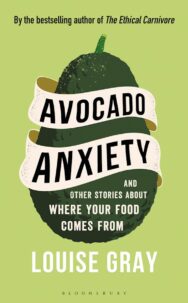‘I believe that by making the consumer aware we can drive those in power to take seriously the role of food in making our population healthier and our environment more resilient.’
For her first book, The Ethical Carnivore, Louise Gray wrote about only eating animals she killed herself in order to explore the impact of meat on climate change. For her second book Avocado Anxiety And Other Stories About Where Your Food Comes From, the author explores the role of fruit and vegetables in shaping our environment. She tells BooksfromScotland why our diets are key to saving the planet.
Avocado Anxiety And Other Stories About Where Your Food Comes From
By Louise Gray
Published by Bloomsbury
Why we are all suffering from Avocado Anxiety
When we come back to look at the early decades of the 21st Century, the dish that will surely sum up our age is avocado on toast? The fruit (it is in fact a berry) is one of the most popular photos posted on Instagram, you can buy burgers made almost entirely of avocado, the pop star Miley Cyrus had one tattooed on her bicep. It is hugely popular, but then again it is the subject of derision. Avocados are connected to drug cartels in Mexico and water scarcity in Chile. In one meme it was claimed eating avocado on toast rather than saving money for a house, was preventing young people getting on the property ladder.
Is it any wonder that many of us claim to be suffering from ‘avocado anxiety’. We love to eat this most instagrammable of fruit, but they make us feel confused and anxious.
As an author I want to help people negotiate this ethical minefield. Firstly, what is the carbon footprint of avocados? According to the University of Lancaster it is about 1.6kg of carbon dioxide equivalent per kg. This is a lot less than Scottish beef (18kg CO2e per kg) but a lot more than a Scottish potato (0.3kg CO2e per kg). Generally, fruit and vegetables have a lower carbon footprint because it takes a lot less energy to grow a plant than to raise an animal. However, if the vegetables have been flown in by air freight, such as asparagus from Peru (18kg CO2e per kg), it can be up there with steak. A vegan diet generally has a lower carbon footprint, unless you are living off exotic fruits and vegetables flown in from abroad.
But it is not all about carbon. There are other issues to worry about, such as water. Avocados may not have a heavy carbon footprint but they use up a lot of water, around 85 litres to grow an avocado from Peru. When the water is coming from places suffering water shortages such as parts of Spain and South America this can cause droughts, harming local populations and wildlife. The UK government is so worried about the problem, it has ordered Cranfield University to come up with ideas on how to re-balance our exports and imports so we rely less on imported fruit and veg (we currently import 44% of our vegetables and 84% of our fruit), and begin to build back our own horticultural industry. We will also have to learn to put different home-grown ingredients on toast. (In my book there is a recipe for smashed broad beans on toast).
Then there are the issues of human rights. Avocados have been connected to abuse of workers in Kenya and kidnapping of farmers in Mexico. Bananas perhaps have the most shocking history when it comes to human rights. The UK’s most popular fruit is so cheap because it relies on a monoculture built on cheap labour and the clearing of rainforests.
Oh dear, am I making you anxious? I did not mean to. My book actually found as many positive stories about fruit and veg as negative. Fairtrade bananas are just a little bit more expensive than other bananas (it would cost you just £3 extra per year to switch to Fairtrade). Potato farmers are learning how to look after the soil better, largely from watching the organic movement. Horticulturalists are learning how to make space for nature by growing crops such as lettuce on vertical farms indoors, and leaving wild land for birds and other wildlife. As consumers we can cut food waste by eating our leftovers and embracing the wonky carrot, we can eat plant proteins like broad beans and grow our own courgettes.
One answer is simply not being too anxious. When it comes to food, anxiety does not make people behave better in the long run. It tends to make people freeze and later binge on what they wanted to eat anyway. In the most extreme cases it leads to eating disorders. I think instead we could be educating ourselves about the delicious alternatives and the small ways we can make the food system better. We can shop at our local independent greengrocer or order an organic veg box. As a nation we do not eat enough fruit and veg (only a third of adults eat the recommended five-a-day), we need to start filling our plates with vegetables from farmers and growers we trust.
Ultimately it is about government policy. I believe that by making the consumer aware we can drive those in power to take seriously the role of food in making our population healthier and our environment more resilient. School meals could be procured from Scottish farmers, subsidies could be directed at nature-friendly farming and retailers could be encouraged to stock more affordable seasonal fruit and vegetables.
I can’t completely take away avocado anxiety – I’m not sure I want to, it is a product of living in our age. But through my book I hope I can help you worry a wee bit less.
Avocado Anxiety And Other Stories About Where Your Food Comes From by Louise Gray is published by Bloomsbury, priced £17.99.
ALSO IN THIS ISSUE

 Scottish Poetry: 1730 – 1830
Scottish Poetry: 1730 – 1830
‘You’ll think but little of my Songs, When you have read them o’er; But say, “They’re well enough …














